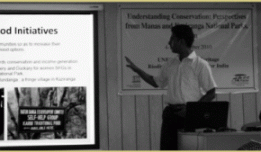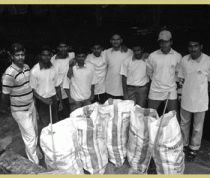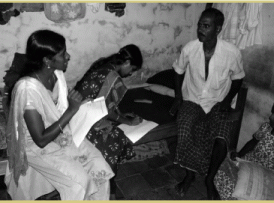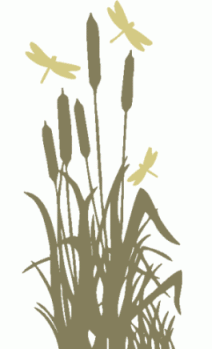| |
 |
 |
Volume 7.3
July-September 2010
For Private Circulation Only
|
| |
In this Issue
Policy and Outreach
Academy Matters
Research
New
|
Western Ghats Nomination as a UNESCO World Natural Heritage Site
The decision on the Western Ghats being declared a UNESCO World Heritage Site is on the anvil. In 2006, ATREE, along with Nature Conservation Foundation and Wildlife Institute of India submitted a proposal to the MoEF, recommending seven sub clusters in the Western Ghats for nomination as UNESCO World Natural Heritage sites. Recently a team from IUCN came to India to assess the Western Ghats qualifications for such a status.
The Government of India is a state party to the UNESCO World Heritage Convention. Based on the 2006 report, the MoEF prepared a nomination dossier for inscription of 39 serial sites in the Western Ghats on the World Heritage List. As per decision taken during the 34th session of the World Heritage Committee held during July-August 2010 in Brasilia, Brazil, a team of UNESCO and IUCN representatives came to India this October to evaluate the Western Ghats serial sites proposed for nomination. In order to deal with matters relating to the inscription and management of the Western Ghats serial sites, a Western Ghats Natural Heritage Management Committee has also been formed. Jagdish Krishnaswamy of ATREE, who has been involved with the nomination effort from 2006, is a member of this important committee on the Western Ghats.
See more on this story on
http://atree.org/western_ghats_whs.
Related press on IUCN team visit is available at
http://atree.org/press.
|
| |
Policy + Outreach
Recognising Tribal Community Rights in Protected Areas
In an exercise that acknowledged individual claims under the Recognition of Forest Rights Act 2006 (RFRA), the government organized a land distribution programme at Yarakatte, Kollegal taluk on 29th August 2010. With this, the RFRA has been implemented in B.R. Hills. 1115 families received land patta to approximately 1600 acres of lands. On the same day, land was distributed in all the tribal podu (settlement) of B.R. Hills. Importantly, the District Commissioner and Divisional Conservation of Forests announced that community rights will be granted.
ATREE has been working with supporting institutions over the last decade, on participatory assessment and monitoring of biodiversity, and after RFRA enactment, on the role of local governance in biodiversity management and conservation, as well as in the process of claiming rights.
The land distribution event was attended by politicians, Forest Department officials of Chamarajanagara, Biligiri Rangaswamy Temple Wildlife Sanctuary and Kollegal; Dr. H. Sudarshan of VGKK; and Zilla Budakattu Girijana Abhivrudhi Sangha and SAS members.
C. Madegowda, B.R. Hills
Read more on http://atree.org/reconciling_conservation_livelihoods
Using Science to Manage Wildlife Parks

Wildlife monitoring, habitat management, human-elephant conflict and participatory conservation practices were the subject of thirteen research papers presented in a research seminar, ‘Understanding Conservation: Perspectives from Manas and Kaziranga National Parks, Assam’. Eminent academics presented their views on the role of science in conservation, possibilities of democratic conservation, culture of conservation and conserving natural resources in the new economic and political era. The Assam Forest Department and UNESCO’s national project coordinator also talked about the status of the world heritage sites.
The seminar was organized on 4th and 5th September by ATREE (UNESCO’s World Heritage Biodiversity Project, Assam) in collaboration with the Indian Institute of Technology, Guwahati (Centre for the Environment and Department of Humanities and Social Sciences).
Niraj Kakati
|
Communicating the Need to Act
Given the pressing need to take immediate action to meet some of our environmental challenges, there is reason to examine what went right in two efforts of plastic waste management as reported by our Vembanad and KMTR teams.
Vembanad: Partners take on the baton

Since 2008, CERC-ATREE has been organizing plastic cleaning campaigns in the Punnamada area of the Vembanad Lake in collaboration with ATREE’s Jalapaadom (study on water) clubs and the All Kerala House Boat Owners’ Association during the popular Nehru Trophy boat race. The partnership seems to have nudged the tourism sector in the right direction, because this year, apart from ATREE’s volunteer NSS groups from S.D College Alappuzha doing a pre-event clean up amounting to 22 kg of plastic, the tourism sector took on the responsibility of post-race plastic collecting. About 120 kg plastic waste was collected by the teams and sent for recycling.
Jojo T.D.
KMTR: From ‘reducing plastics’ to ‘being a better ancestor’
Sorimuthiyan Kovi is a religious enclave within Kalakad Mundanthurai Tiger Reserve (KMTR) where 3-4 lakh devotees converge during adi-amavasai. In 2006, ATREE’s Agasthyamalai CCC started an intense anti-plastic campaign during festival time that culminated in involvement of the Forest Department and imposition of ban on plastics inside the reserve in 2008. This year, plastic use has come down visibly and the Agasthya team made its campaign objectives more ambitious by also addressing issues of collection of firewood, and litter at pilgrims’ camp sites. This expanded theme has been termed ‘Be a better ancestor’ campaign.
The direction has been guided by the team’s assessment (starting 2008) of the impact of the festival on surroundings through scientific monitoring of physical and biological parameters like monitoring animal trails to see how movement and habitat get affected by the presence of pilgrims; trends in road-kills caused by increased festival traffic; and water quality. The team also interacted with pilgrims to assess their perception of the festival and the effectiveness of the ATREE campaign.
|
This year, about 500 volunteers including high school students, local entrepreneurs, senior research fellows, software engineers, wildlife enthusiasts and senior scientists participated in plastics monitoring and cleaning, and research and monitoring of physical and biological parameters during and after the festival.
Rajkamal Goswami
Robust Stakeholder Frameworks in Sustainable Fishing
Vembanad gives an idea of mechanisms that might be employed to engage with and grow a local stakeholder partnership in a democratic form. In 2008, CERC, Vembanad formed three Lake Protection Forums (LPF) in Muhamma Panchayat region, involving in it inland fishermen of the area. These forums associated with ATREE in various conservation activities around the lake and later, took the initiative to set up fish sanctuaries in the Vembanad. These proved to be successful as per the experience of the fishermen as well as scientific evaluations conducted by ATREE with the support of the Fisheries Department of St. Albert’s College. More Lake Protection Forums were formed and a protective network for the lake gradually developed.Recently, the Vembanad team celebrated the formation of ‘Samyuktha Kayal Surakshana Samithy’, a federation of Lake Protection Forums, when twelve LPFs in the Muhamma Panchayat region registered as a federation. Its mandate will be to organize more LPFs, strengthen LPF activities, mobilize resources for LPF functions, represent the LPF in forums and build capacity to guide and monitor the activities of LPFs. The federation plans to start by setting up ten additional fish sanctuaries. ATREE will help with project proposals and through capacity building in the initial set-up phase. A convention of LPFs, under the leadership of the federation, is scheduled in January 2011.
Latha Bhaskar

|
Academy
Seeding Biodiversity Appreciation

Biodiversity in itself is inspiration, is the maxim of the certificate course on conservation science and allied social sciences developed by ATREE. This course, which combines lectures, field visits and hands-on research projects, has been popular among students for its touch-feel-see quality of exposure to real-life field situations. For ATREE, the course is an investment in next-generation environmental professionals.
This year’s course was held from 10 to 23 August for young professionals, graduates and post grad students. The course began in Bangalore with an introduction to the ‘science’ of conservation by ATREE faculty, staff and external resource personnel. The lectures focused on conservation issues at the regional level but with a global perspective. This was interspersed with interactive discussions in the first four days.
|
Field exposure and getting familiar with the tools of the trade took place at a tour of the Agasthyamalai field academy. Students got an overview of ATREE’s work in the region, along with field trips to the Kakachi and Kodayar wet, evergreen forests, and Mundunthurai’s dry, evergreen and deciduous forests. Read more about what the students did and some of the interesting studies they came up with in our Agasthya newsletter.
A similar course is being planned for the North-eastern region in partnership with Aaranyak at Guwahati in January 2011. This certificate course is an initiative of the Academy for Conservation Science and Sustainability Studies, and is supported by the Jamsetji Tata Trust.
Vivek Ramachandran
Rural Agricultural Works Experiences
A survey on use of fertilizers and pesticides, farmers’ views on biodiversity in agricultural fields, organic farming and future plans was conducted among Zamin Singampatti and Pappankulam farmers by the Rural Agricultural Works Experience (RAWE) students from Agricultural College and Research Institution of Tamil Nadu Agricultural University (TNAU). This exercise was part of an annual exposure visit for RAWE students to the Agashtyamalai field academy. The RAWE programme helps students build skills in home gardening and farming and helps them gain knowledge of local farming practices. This year the focus was on non-crop biodiversity in agricultural landscapes. Eight students visited the CCC, from 22 September to 6 October.
|
The survey showed farmers used high doses of pesticides despite being aware of the fact that these also killed non-target species such as frogs, snails, snakes, garden lizards and sometimes even mongoose. Students spoke to farmers about minimizing chemical inputs and practicing modern farming methods such as System of Rice Intensification (SRI).
Power-point aided lectures and field visits were used to talk about benefits and successes of home gardening, green buildings for better environment, natural farming, need for biodiversity conservation in forest fringe villages and ATREE’s initiatives in the KMTR landscape. Patrick David, Merlin Gnana Jeeva, Mahesh Krishnan and Tamizhazhagan from ACCC coordinated this programme.
M. Mathivanan
|
Research
Framing Methodologies for Defining Socio-economic Status
The Ministry of Rural Development entrusted ATREE to pre-test methodologies for identification of BPL (Below Poverty Line) households prior to the next BPL census. This pilot Participatory Socio-economic Study (PSES) was carried out in two villages, Veliyanad in Alleppey district and Amboori in Trivandrum district of Kerala.
ATREE’s Vembanad CERC team spent time building rapport with respondents, carried out a social mapping to identify households in the villages and categorized households by well-being ranking. While the main objective of the PSES was to determine the socio-economic status of households using a participatory approach, the survey also yielded people’s criteria for arriving at the different well-being categories of households, with possible quantification.
The report of the PRA (Participatory Rural Appraisal) exercise was submitted to the Commissionerate of Rural Development, Trivandrum. Latha Bhaskar, Jojo.T.D., Krishna Kumar, Kishore and Biju Abraham participated from CERC. Bejoy Thomas attended the programme from ATREE. Benno Pereira (Professor, St. Albert’s College, Ernakulam), P.J. Joseph (Rtd. Asst. Director, Agriculture Department), Amaldev S. (Researcher) joined ATREE’s team as external consultants.
Latha Bhaskar
|
New
Staff
Rohini Y.M., Accountant
Ashoka B., Accounts Executive
Chitra Ravi, Programme Officer, Eco-informatics Lab
Biju Abraham, Research Associate
Poorna Balaji, Research Associate
Interns
Ms. Ratee Shrestha from Nepal who is doing a Masters in Tropical Ecology from Norwegian University of Life Sciences. Her thesis is on ‘Estimating above-ground biomass and evaluating the effects of local eco-management strategies for carbon sequestration and biodiversity conservation in the Kalakad Mundanthurai Tiger Reserve, Western Ghats’ under the supervision of Dr Torbjørn Haugaasen from Norwegian University of Life Sciences and T. Ganesh, ATREE. Ratee received an ATREE-NORAGRIC grant for her research.
K. Narendra Varma, a B.E. Civil Engineering from Birla Institute of Technology and Science, Pilani. His main area of interest is application of remote sensing and geographical information systems in environmental modeling. He will be working under the supervision of Mohan Seetharam for one month in September and November.
Cody Patterson, a University of Washington Tacoma, Environmental Studies student is working with the Communication team from September to December, to create new content on CCC related work, for the website.
|
Venkat Ramanujam, who has an MA in Social Work from TISS, and an M.Phil in Environment, Society & Development from University of Cambridge, UK, will be working with Sharachchandra Lele on a short-term study of JFM and NTFP management in Madhya Pradesh between September and January.
Publications
Remadevi, O.K., T.O. Sasidharan, J. Bhattacharya, C.R. Vossbrinck and P.D. Rajan. 2010. Some pathological effects and transmission potential of a microsporidian isolate (Nosema sp.) from the teak defoliator Hyblaea puera (Lepidoptera: Hyblaeidae). International Journal of Tropical Insect Science, 30(3), 138-144.
Savitha Swamy and Soubadra Devy. 2010. Forests, heritage green spaces and neighbourhood parks: Citizens attitude and perception towards ecosystem services in Bangalore. Journal of Resources, Energy and Development. September issue. Accepted paper.
Ariza-Montobbio, P., S. Lele, G. Kallis and J. Martinez-Alier. 2010. The political ecology of Jatropha plantations for biodiesel in Tamil Nadu, India. Journal of Peasant Studies. 37 (4), pp. 875-897. September 2010.
Ranganathan, J., J. Krishnaswamy and M.O. Anand. 2010. Landscape-level effects on avian species communities within human-dominated ecosystems in the Western Ghats: Insights for management and conservation. (Online and In Press). Biological Conservation. doi:10.1016/j.biocon.2010.04.018
|
|
Purushothaman, S., S. Kashyap. 2010. Trends in land use and crop acreages in Karnataka and their repercussions. Karnataka Journal of Agricultural Sciences. 23 (2): (330-333) 2010.
Aravind, N.A., D. Rao, K.N. Ganeshaiah, R. Uma Shaanker and J.G. Poulsen. Impact of lantana camara on bird assemblage at Malé Mahadeshwara reserve forest, South India. Tropical Ecology, 51: 325-338. 2010.
Nagendra, H., and D. Gopal. 2010. Tree diversity, distribution, history and change in urban parks: studies in Bangalore, India. Urban Ecosystems doi 10.1007/s11252-010-0148-1.
Bonell, M., B.K. Purandara, B. Venkatesh, J. Krishnaswamy, H.A.K. Acharya, U.V. Singh, R. Jayakumar and N. Chappell. 2010. The impact of forest use and reforestation on soil hydraulic conductivity in the Western Ghats of India: Implications for surface and sub-surface hydrology. Journal of Hydrology 391: 47–62. doi:10.1016/j.jhydrol.2010.07.004.
David, J. Patrick and V. Atkore. 2010. A note on feeding habits of fruit bats in Colaba, urban Mumbai, India, Small Mammal Mail (Bi-Annual Newsletter of CCINSA & RISCINSA), Volume 2, Number 1, 9-11, Jan-Jun 2010.
Book Chapters
Davidar, P., V. Palavai, K. Yoganand, T. Ganesh and M.S. Devy. 2010 . Distributional patterns of some faunal groups in the Andaman islands: conservation Implications. 2010. In: Recent trends in biodiversity of Andaman and Nicobar islands, (eds) Ramakrishna, Raghunathan, C. and Sivaperuman, C. 1-542 (published by the director, Zoological Survey of India, Kolkata).
|
Elmqvist, T., M. Tuvendal, J. Krishnaswamy and K. Hylander. Ecosystem services: managing trade-offs between provisioning and regulating services. Pages 24 to 39. In: Valuation of regulating services of ecosystems: methodology and applications (ed. Pushpam Kumar Mike Wood. ed(s) (Forthcoming). Routledge, London, 2010.
Popular Press
Harini Nagendra, Maps, lakes and citizens, Seminar 613. September, 2010.
Nachiket Kelkar and Jagdish Krishnaswamy, Keeping rivers alive, Seminar 613. September, 2010.
Harini Nagendra, Ringing out the old, Deccan Herald, 31 August, 2010.
Vidyadhar Atkore, Freshwater Jewels, Sanctuary Asia, August 2010.
Kamaljit S. Bawa, Our biodiversity, our life, our future, Survey of the Environment, 2010 published by The Hindu, 2 August, 2010.
Harini Nagendra, Protecting urban biodiversity, Survey of the Environment, 2010 published by The Hindu, 2 August, 2010.
Abhisheka K, Aravind N.A, Ganesh T. Attention, young eco champs! Deccan Herald, 22 July, 2010.
Workshops
Jalapaadom student workshop on ‘The use of schoolyard ponds for fish biodiversity improvement’ held on 8 September 2010 at CERC. 60 participants from 20 schools participated in the programme.
|
5-day workshop on ‘Science Communication’ conducted by Dr. Goeff Hyde, consultant from NCBS, starting 17 August 2010.
Orientation workshop for Jalapaadom-associated teachers, in which 34 teachers participated. The workshop was held 8 July 2010 at CERC, Vembanad.
Jagdish Krishnaswamy. Chaired a panel discussion and workshop on ‘Conservation targets: Should we focus on species, ecosystems or ecosystem services’, at student conference in conservation science, Bangalore, 17 June 2010.
Talks by ATREE Staff
Siddappa Setty R., keynote address on ‘Eco tourism in India’ at World Tourism Day celebration at Chamarajanagara Deputy Commissioner office on 27 September 2010.
K. R. Shivanna, INSA Honorary Scientist, lead talk on ‘Pollen-pistil interaction: A complex mating game before fertilization in flowering plants’ at a Conference on Developmental Biology organized by the Department of Botany, Bangalore University, 15-17 September 2010.
Siddappa Setty R., talk on ‘Conservation education’ at inauguration of Eco Club at Ramapura Girls High School, Kollegal taluka, Chamarajanagara district on 15 September 2010.
|
|
Siddappa Setty R., on ‘Conservation and education’ at GE as part of World Environment Day celebrations where around 550 students from 13 different schools participated in the programme. 7 August 2010.
Siddappa Setty R., a series of talks on ‘Conservation and sustainable harvest of natural resources’. Audience included Gram Panchayat representatives at Mahatma Gandhi Institute of Rural Energy and Development, Bangalore, between July to September 2010. He also spoke on biodiversity conservation and environmental sustainability to a school audience at Mahatma Gandhi Institute of Rural Energy and Development, Bangalore on 22 July, 2010.
Talks at ATREE
Dr. Geoff Hyde, NCBS, Bangalore on ‘Popular Science Writing’, 1 September 2010.
Dr. Udayalakshmi Vepakomma, Post doctoral Fellow at University of Toronto, ‘Disturbance dynamics and forest canopy responses - an exploration through multi-temporal lidar data’, 4 August 2010.
Mr. Suresh Chauhan, TERI University, Delhi. ‘Forestry CDM Project Development’, 19 July 2010.
Mr. Ashish Agarwal, TERI University, Delhi, ‘Reducing Emissions from Deforestation and Degradation (REDD) plus: Issues and Opportunities’, 19 July 2010.
Presentations
S. Lele on ‘Multi-disciplinary perspectives on the forest problem, and searching for common ground’, Emmett Interdiscpilinary Programme in Environment and Resources, Stanford University, Stanford, 28 September 2010.
|
S. Lele on ‘Ecosystem Services versus Environmental Governance: Debates from India’ at Natural Capital Project, Woods Institute for the Environment, Stanford University, Stanford, USA, 16 September 2010.
T. O. Sasidharan. ‘Prospects of new Microsporidium (Nosema sp.) for Biological Control of the teak defoliator, Hyblaea puera Cramer (Lepidoptera: Hyblaeidae)’ at the “XXIII IUFRO World Congress: Forests for the future - Sustaining Society and the Environment” held in Seoul, Korea from 23-28 August, 2010.
Kavitha A. ‘Role of Agro-forestry on community livelihood and climate mitigation in semi-arid region of south India’ at the 2nd international conference: Climate, Sustainability and Development in Semi-arid regions in Fortaleza, Brazil, 16-20 August 2010. The scholarship was given by the government of the State of Ceara, Banco do Nordeste, Ministry of Environment and Ministry of Science and Technology.
Siddappa Setty R., two presentations on improved methods of honey and amla harvest at a workshop at Thalaimalai forest for the Soliga’s and Hiruliga tribes through Tamil Nadu Agriculture University on 10 July 2010.
Grants Received
Jagdish Krishnaswamy and Shrinivas Badiger. For project titled ‘Negotiating tradeoffs: Making informed choices about ecosystem services for poverty alleviation’, in collaboration with University of Cambridge-UK, University of Oxford-UK and Winrock International India-Delhi. The project is funded under ESPA (Ecosystems Services and Poverty Alleviation) programme with funding from DFID (UK Department for International Development), NERC (Natural Environment Research Council, UK) and ESRC (Economic and Social Research Council, UK)
|
Kavitha A., Senior Research Associate. Rufford small grants for Biodiversity conservation through education programmes in the Kanakapura region of South India.
Vishakha Chiplunker received a NORAGRIC_ATREE small grant in July 2010.
Certificate Courses Conducted
15-day field-based course in Conservation Science for young professionals, graduates and post graduate students. 10-23 August, 2010. (see story on Seeding Biodiversity Appreciation)

|
Offices
Bangalore
Royal Enclave, Sriramapura
Jakkur Post, Bangalore 560 064
Tel: +91-80-23635555,
Fax: +91-80-23530070
Eastern Himalayas
E2, Second Floor, Golden Heights
Gandhi Road, Darjeeling 734 101
West Bengal
Tel: +91-354-2259297
New Delhi
2nd Floor, 1, K Commercial Complex
Birbal Road, Jangpura Extension
New Delhi 110014
Tel: +91-11-2432 3133
|
Governing Board
Executive Board
Dr. K.S. Bawa
Dr. R. Uma Shaanker
Dr. K.N. Ganeshaiah
Dr. Darshan Shankar
Dr. S.N. Rai
Dr. Surinder M. Sehgal
Ms. Rohini Nilekani
Dr. Jeta Sankrityayana
Ms. Seema Paul
Mrs. Pheroza Godrej
Dr. K.S. Jagadish
Dr. Nandini Sundar
Mr. A.N. Singh
Dr. Ganesan Balachander
Dr. Gladwin Joseph (ex-officio)
Advisory Board
Dr. R.A. Mashelkar
Dr. Peter Raven
Dr. Dan Martin
Dr. Jagmohan Maini
Executive Committee
Dr. Gladwin Joseph (Director)
Mr. Suman Rai (Regional Director– Eastern Himalayas)
Dr. Ankila Hiremath,
Dr. Priyadarsanan Dharma Rajan
Dr. Nitin Rai
Dr. Soubadra Devy
Dr. R. Ganesan
Dr. Robert Chandran.
|
www.atree.org
This newsletter has been constructed from reports
and contributions by ATREE folk. Design and Layout
is by Salil Divakar Sakhalkar. Editing by Philip Peter
and Meetu Desai.
|
|
|